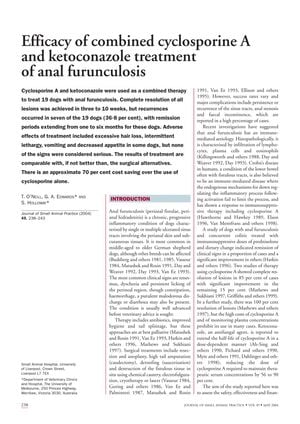TLDR Combining cyclosporine A and ketoconazole can effectively treat anal furunculosis in dogs, with some experiencing recurrences and mild side effects.
In a study from 2004, 19 dogs with anal furunculosis were treated with a combination of cyclosporine A and ketoconazole, resulting in complete resolution of lesions in three to 10 weeks. However, 36.8% of the dogs experienced recurrences with remission periods ranging from one to six months. Some dogs exhibited adverse effects such as excessive hair loss, lethargy, vomiting, and decreased appetite, but these were not considered serious. The combined treatment was found to be as effective, if not more so, than surgical options and offered a cost saving of approximately 70% compared to using cyclosporine alone.
 55 citations
,
July 2013 in “Dermatologic therapy”
55 citations
,
July 2013 in “Dermatologic therapy” Some dermatological medications can impair male fertility, so consult a doctor before trying to conceive.
 90 citations
,
May 2019 in “Drugs”
90 citations
,
May 2019 in “Drugs” Long-term use of azole antifungals can cause hair loss, hormonal imbalances, and severe skin reactions.
 117 citations
,
March 2013 in “Journal of the European Academy of Dermatology and Venereology”
117 citations
,
March 2013 in “Journal of the European Academy of Dermatology and Venereology” No effective treatment for frontal fibrosing alopecia was found, but oral 5-alpha-reductase inhibitors had the best response; for lichen planopilaris, topical corticosteroids were commonly used but had a high relapse rate.
 32 citations
,
November 2011 in “International Journal of Dermatology”
32 citations
,
November 2011 in “International Journal of Dermatology” Diagnose and manage CCCA with thorough history, exams, and labs; treat with anti-inflammatory agents, stress reduction, and stopping harmful hair practices.
 February 1990 in “Journal of The American Academy of Dermatology”
February 1990 in “Journal of The American Academy of Dermatology” New skin treatments in 1987-1988 showed effectiveness for various conditions, but some had side effects or risks.





